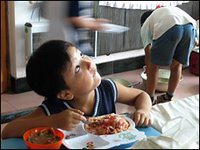Children of Chinese Prisoners: Who Cares For Them?
 In China, Children of Inmates Face Hard Time Themselves
In China, Children of Inmates Face Hard Time ThemselvesDALIAN, China -- The children answer to nicknames such as "Seagull," "Brightness," "Summer" and "Ocean," but they come with scars that social workers initially mistake for dirt. When they first arrive at the two-story house here, they hoard toothpaste, or they hide new socks and steamed buns in their bed quilts, as if they were precious gems.
They are the children of prisoners, and in this country, they belong to no one.
The law is unclear on who should provide for the children of China's more than 1.5 million prisoners. No government department is willing to supervise them. Historically, relatives have taken them in, but in practice, many unwanted children are shuffled from family to family. Sometimes, even the families do not want them...
The reasons for the neglect can be traced to China's bureaucratic system, but also to the scorn with which some Chinese have traditionally regarded criminals and, by extension, their children. In rural areas especially, the stigma against criminals and their families is felt almost as strongly as it was during the Cultural Revolution, the brutal 10-year campaign of terror that pitted youth against parent, wiped out any notion of trust and taught millions of people to shun "bad elements."...
Hai Xia, 6, the youngest at the home, is the daughter of a mafia boss killed in an accident and a drug-dealing mother imprisoned for life when Hai Xia was 2.
Pan, the executive director, said that Hai Xia had nearly been adopted before she came to the home. But the Chinese couple that was interested in the girl had demanded that she never again see her mother. They thought the mother would be a bad influence.
"Chinese people have some traditional ideas, in that if your father commits crimes, your son will be a criminal, too, or the son will always follow the father's path," Yang said. "I think the discrimination is always there. Chinese people don't want to be associated with bad elements."...
The home would have better access to international funding if it were registered with the government as a nongovernmental organization, or NGO, but the government makes the process extremely difficult -- to the point that local civil affairs officials have failed to even explain to Pan whom she must see to register.
The problem is a loophole in the law that fails to address prisoners' children. But adding to the problem is the government's year-old investigation of NGOs, especially U.S.-funded organizations suspected of having ulterior motives. Registration of new groups has come to a virtual standstill...
An Aug. 1 letter from the father of the home's newest resident, Hai Chen, 10, reached Pan last month.
"I've been in prison for three years and every moment I think of my crime I'm filled with regret. I know my crime has brought pain and harm to my family, to society and to the country," wrote the man, who is in prison for stealing a car. "I have learned that my son was not abandoned by society, but was adopted by the Children's Village. I can't do anything to thank you except to rebuild my life. Please educate my son strictly so he will never be like his father."


0 Comments:
Post a Comment
<< Home